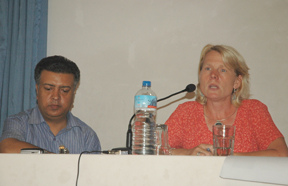Lecture Series
Emergent Forests: Networks, Subjectivity, And The Governance Of Natural Resources

Andrea Nightingale
on
Emergent Forests: Networks, Subjectivity, and the Governance of Natural Resources
Forestry management issues in Nepal are highly complex and embedded within networks of ecologies, politics, cultures, and institutions. In this presentation, I weave together ethnographic accounts of forest management and governance with an analysis of ecological and institutional change. I demonstrate how the geographical, cultural, historical, and ecological specificities of localities are important for the emergence of governance regimes. What is at stake is understanding how material processes, subjectivities, symbolic understandings, and power intersect to produce what we understand as ‘forests’, ‘civil society’, and ‘governance’. These networks of relations draw attention to the ways in which subjects are necessarily constituted in relation to each other as well as in relation to ‘forests’. Through such an approach, I aim to animate these networks, demonstrating the importance of practice in the emergence of socio-ecological regimes. The focus on subjectivities opens up space to rethink the nature-society nexus, particularly when such an analysis is linked to the politics of knowledge and institutions surrounding natural resource management. Here, I find notions of governmentality and feminist understandings of subjectivity to be particularly useful in allowing for a focus on the practices and contexts within which material forms such as ‘women’, ‘villager’, and ‘community forestry’ emerge.
* * *
Listen to or Download lecture in audio format
Andrea Nightingale is a Lecturer in Environmental Geography in the School of GeoSciences at the University of Edinburgh. She has over 20 years’ experience doing research in Nepal. Beginning as an undergraduate and continuing through her PhD and present position, she has lived in Humla and Mugu districts and travelled extensively throughout the country. She has also worked in Bolivia, Argentina, India, Indonesia, and Scotland on issues related to natural resources and social justice. Her research focuses on the interface of social and natural systems using Community Forestry in Nepal as a case study and, more recently, fisheries management in Scotland. Her work has pioneered new ideas around how to understand the link between issues of social justice and natural resource management in addition to her work on gender, caste, equity, and knowledge.
